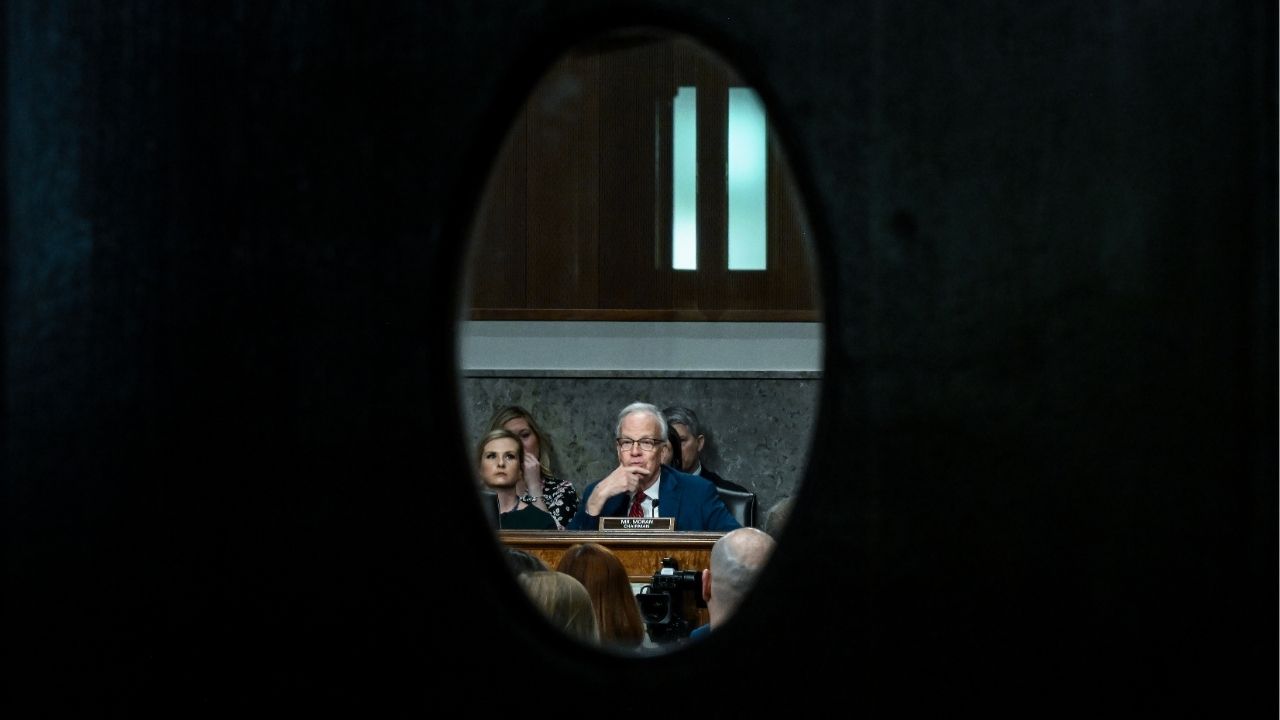Sen. Jerry Moran (R-Kan.) participates in a confirmation hearing at the Capitol in Washington, Jan. 21, 2025. Moran has warned about the effect sweeping cuts to Medicaid — a key component of the House Republican budget — could have on his state and rural health care across the country. (Kenny Holston/The New York Times)

- Sen. Jerry Moran warned GOP budget cuts could devastate rural hospitals and hurt Kansas health care access.
- GOP senators including Hawley, Murkowski, and Collins oppose deep Medicaid cuts despite House conservatives' push for reductions.
- Speaker Johnson promised spending cuts but faces internal conflict as senators resist harming key entitlement programs like Medicaid.
Share
|
Getting your Trinity Audio player ready...
|
WASHINGTON — When Republican leaders weigh which of their members might defy the party and defect on major legislation, Sen. Jerry Moran’s name rarely comes up.
So it was all the more remarkable when Moran, a third-term senator from Kansas, went to the floor last week to issue a stark warning about how the budget blueprint his party was about to approve could affect his state.
Noting that the budget plan that Republicans were considering could lay the groundwork for sweeping cuts to Medicaid, Moran warned that such reductions might threaten struggling rural hospitals and, by extension, the future of the rural American heartland.
“I want to make certain that my colleagues know, in my view, the value of making certain we do no harm to those in desperate need of health care in Kansas and across the country,” Moran said
Speaker Mike Johnson was able to put down a revolt Thursday and push through that blueprint to deliver President Donald Trump’s agenda of spending and tax cuts by promising House conservatives that their colleagues in the Senate would join them in cutting $1.5 trillion in federal spending over the next decade.
The problem for Republicans is that it is increasingly clear that some GOP senators simply do not have the appetite for the kinds of deep cuts that their counterparts in the House are agitating for. In recent days they have expressed concerns about repealing the entirety of President Joe Biden’s Inflation Reduction Act and restricting access to food stamps.
Medicaid Cuts Brings Resistance
But no issue has drawn quite so much resistance as the prospect of cuts to Medicaid.
“I’m not going to vote for Medicaid benefit cuts,” Sen. Josh Hawley of Missouri, who has been one of the most outspoken Republicans on the issue, told reporters Thursday shortly after the House adopted the budget resolution. “So if they want my vote here, then it won’t contain Medicaid benefit cuts.”
Republican leaders have insisted that they have no plans to cut Medicaid, and Johnson said Trump would not endorse cuts to Social Security, Medicare or Medicaid benefits.
“We’re going to protect the benefits that everyone is legally entitled to,” Johnson said.
But it will be nearly impossible for Republicans to get to $1.5 trillion in spending cuts without touching Medicaid. Though Johnson suggested the party would consider imposing work requirements and rooting out waste, fraud and abuse, those changes would almost certainly not be enough to reach their target.
The conundrum GOP leaders have been facing in the Senate broke into the open late last week when that chamber pushed through a compromise budget plan that included elements of one the House passed in February that asks the committee overseeing Medicaid to find $880 billion in cuts. Senate Republicans had previously been able to avoid specific discussions about potential cuts to Medicaid, and scrutiny had focused on their politically vulnerable colleagues in House.
But when Sen. John Thune of South Dakota, the majority leader, sought to bring the resolution to the floor, Republican senators initially balked. A group of holdouts, including Sen. Susan Collins of Maine, privately huddled with Thune to air their concerns.
When they emerged from the meeting, Thune had the votes to proceed. But senators warned that they would not be willing to approve final legislation that would take a meat ax to a health care program many of their constituents rely on.
Conservatives Demand Deep Spending Cuts
The same situation played out in the House this week in reverse, when conservatives demanding deep spending cuts initially refused to back a compromise version of the budget plan that requires the Senate to find only $4 billion in reductions over a decade — a tiny fraction of the cuts outlined by the House. Rep. Chip Roy of Texas, one of the holdouts, said he had relented only after being assured by Trump and party leaders in both chambers that the final product would include vast cuts to federal entitlement programs, including Medicaid.
A poll conducted last month by Fabrizio Ward, the firm of Trump’s top campaign pollster, found broad disapproval of cutting Medicaid, including among voters who backed the president in 2024. (The poll was conducted on behalf of the Modern Medicaid Alliance, a coalition of organizations that includes insurers and health care providers.)
Sen. Lisa Murkowski of Alaska, who has made clear to her colleagues in recent weeks that she believes cutting Medicaid would be particularly disastrous for her state, aired a laundry list of concerns with the resolution. It included the “instruction to a House committee that would require significant cuts to Medicaid.”
“If the final bill falls short on any of those fronts, I would be unable to support its passage,” Murkowski said.
Murkowski and Collins joined Democrats last week to back a bipartisan amendment led by Hawley that would have eliminated the Medicaid cuts from the budget. Their effort failed after GOP leaders labored to ensure its defeat. A broader amendment vowing to protect Medicaid and Medicare passed.
Sen. Jim Justice, R-W.Va., where about 28% of the population is enrolled in Medicaid, has said the program is “monstrously important” to his state. He told Axios that he was concerned about his party’s Medicaid proposals, and while he would support imposing work requirements on beneficiaries, he wanted more information about limiting Medicaid expansion.
He has since taken a more sanguine tone.
“I’ve said over and over and over, we all have legitimate reasons to feel concerned,” Justice said in a brief interview. “But I really don’t believe at the end of the day that President Trump is going to hurt our seniors or our kids.”
—
This article originally appeared in The New York Times.
By Catie Edmondson and Michael Gold/Kenny Holston
c. 2025 The New York Times Company
RELATED TOPICS:
Categories

Turnout High as Voters Decide Mayor’s Race



















